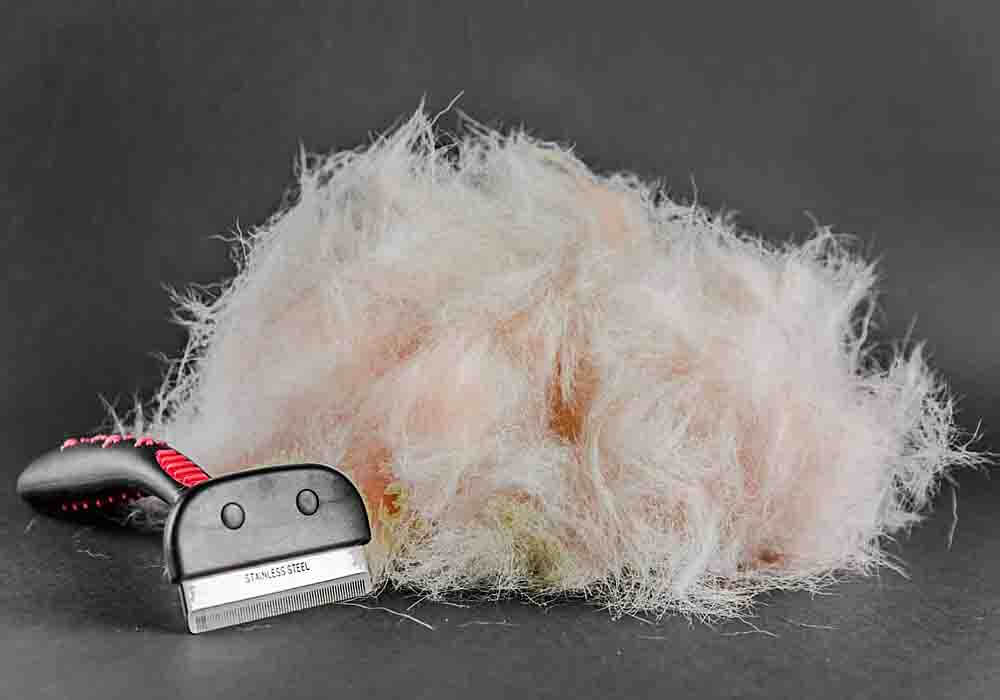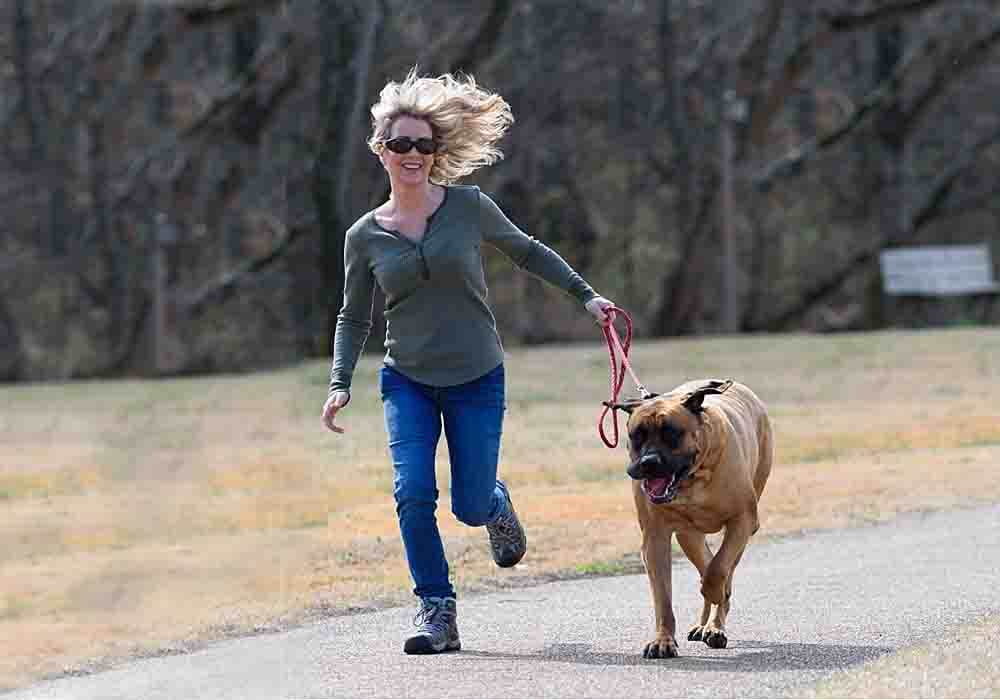Why Do Mastiffs Have A Short Lifespan?
Might It Be Size Related?
by Ken Alden
Ever wonder why do Mastiffs have a short lifespan? Obviously you want yours to live forever, yet, you have probably realized that the average lifespan of a Mastiff is one of the shortest ones in the canine kingdom.
Why Do Mastiffs Have A Short Lifespan?
As a whole, Mastiffs have an estimated lifespan of 6 to 10 years. This is due to the many health conditions this breed is predisposed to, such as:
- Dysplasia
- Hypothyroidism
- Bloat
- Arthritis
- Wobbler Syndrome
- And Cardiovascular diseases
Also, studies have linked the giant size of Mastiffs with their short life.
Nonetheless, chances are that you are already deeply in love with your new friend, and everything you wish for is to see him or her grow strong and live for many years. While some genetic factors cannot be altered, read on to find out some tips on how to help your Mastiff be healthier for longer! Read More Below...
Pro-tip: Ever try lifting a Mastiff? Their weight can hurt not only your back but their joints when they hop down from cars, sofas or even your bed. To protect your back and theirs check out the best Mastiff ramps on Amazon.com now.
Table Of Content - Jump To Links
Why
Do Mastiffs Have A Short Lifespan
Might Their Size Shorten Their Lives?
Health Conditions Can Shorten Lives
Tips To Lengthen Your Mastiffs Life
Average Lifespan By Mastiff Breed

Why Do Mastiffs Have A Short Lifespan? Let's Dig Into This Further...
Mastiffs are among the most powerful, loyal, and ancient types of dogs in the world. They have been used as war or hunting dogs, and they have been a faithful companion for humans for over 2000 years. Yet, they are afflicted with one of the shortest lifespans in the canine family.
In fact, while medium-sized purebred dogs can live anything between 10 and 18 years, Mastiffs’ life expectancy is reduced to up to 12 years. In some cases, such as for the Bordeaux Mastiff or Dogue de Bordeaux, this number even drops to 8.
There have been several studies looking into the causes of such a short lifespan that have linked it to both health predispositions and size. Let’s have a look in detail at how these factors can affect the life expectancy of your pet.
Why Their Large Size Can Be A Contributing Factor
To The Mastiff’s Short Lifespan
Firstly, it is noticeable that smaller dog breeds tend to live much longer than larger breeds such as Mastiffs, Bernese Mountain Dogs, and Irish Wolfhound. This has inspired a number of studies, such as the ones conducted in 2005, 2013, and 2016, that have eventually linked the size and lifespan of dogs.
The findings of these studies are:
- Large dogs grow quicker, and this affects their immune system and increases the number of free radicals in their bodies.
A smaller dog such as a Cocker Spaniel will reach maturity within two years when he weights around 14kg. In the same amount of time, a Mastiff will grow to weigh around 80kg. This rapid growth has seen to affect the output of the thymus, the gland primarily responsible for the health of the immune system.
- There is a clear link between size and aging rate
While the reasons for this are not yet clear, it has been seen that, within the same species, larger individuals age faster than smaller individuals.
Pro-tip: Mastiff anxiety, aggression, destructive chewing, jumping up, fearfulness, and other behaviors can be controlled with the right training program.
Here’s a great course that
addresses these issues along with many other dog training basics: Check it out now!
What Health Conditions Affect The Lifespan of Mastiffs?
Similarly to other breeds, Mastiffs are predisposed to many health disorders and conditions that considerably lower their life expectancy. Here are the ones you should be looking out for:
- Hip Dysplasia and Elbow Dysplasia: these are two similar conditions that often originate from abnormal development. The large size and rapid growth of Mastiffs make them particularly prone to it. This condition refers to the loosening of the hip or elbow joints. This can cause pain, difficulty of movement, and even instability.
- Arthritis: This condition is caused by the inflammation and stiffening of joints. It can be incredibly painful for your Mastiff and, once the joints have been damaged, there is yet no cure available.
- Wobbler Syndrome: Particularly common in large and giant breed dogs, this neurologic disease affects the neck region of the spine. It can cause neurologic disability and can be treated through anti-inflammatory drugs or surgically.
- Dilated Cardiomyopathy: This is one of the most common cardiovascular diseases contracted by Mastiffs. It happens when the heart is not strong enough to pump adequate blood through the body. While the development of this disease is slow, it can be lethal for the patient.
- Hypothyroidism: This condition is usually caused by an inflammation of the thyroid gland, which is responsible for controlling many body functions. If not treated promptly, it can lead to more serious health conditions.
- Bloat (GDV or Gastric Torsion): This disorder is one of the most common causes of death for Mastiffs. It happens when the stomach fills with air, twists on itself, and prevents blood and oxygen from circulating through the body. This is a medical emergency and, if not treated immediately, can lead to death in a matter of hours.

Each mastiff breed has different life expectancies. If you've wondered about that of your own mastiff, be sure to visit our page How Long Do Mastiffs Grow And Live.
Pro-tip: Mastiff's (and their owners) love dog crates…and for good reasons. Crates keep dogs from mischief while you're away, are perfect for house training, for traveling by car, and provide the dog a place to de-stress. Check out the best Mastiff crates on Amazon.com now.
Tips to Help Your Mastiff Live Healthier For Longer
While some genetic factors cannot be fought, there are some preventive measures that you could take to try to improve the lifespan of your Mastiff.
- Exercise: exercise is incredibly important during the life of your Mastiff. In fact, without physical stimulation, your dog won’t be able to strengthen its muscle legs, a vital factor if he or she is affected by a bone or joint condition later on in life. During your Mastiff’s development phase, introducing just the right amount and type of exercise is essential. In fact, jumping, running, and demanding exercise can lead to future health conditions. On the other hand, a lack of stimuli can lead to obesity. Read Here our article about the Mastiffs exercise needs.
- Nutrition: since your puppy will be growing incredibly fast during his first years, nutrition is one of the most important factors for your dog to live a healthy life. Speak to your vet to find out a nutrient and balanced eating plan for your Mastiff. To lower the likelihood of Bloat, avoid feeding your Mastiff only once a day. This page on our site will tell you what you need to know about feeding your puppy thru out it's puppyhood.
- Socialization: socialization can help your Mastiff release accumulated energy and stress, which can be incredibly detrimental for its health. At the same time, by letting your Mastiff socialize and free play, you will avoid the destructive behavior that can cause damage within your household. Learn some great socialization techniques from this page on our site.
- Keep yourself informed: many of the conditions that develop towards being life-threatening for your Mastiff have clear medical signs. As an owner, it is your responsibility to be aware of them to be able to start medical treatment immediately and save your dog’s life.
Learn more about Caring For Senior Mastiffs
Average Lifespan Of A Mastiff Dog By Breed
As we have seen, the average lifespan of a Mastiff is between 6 and 10 years. However, this varies depending on the breed of your dog. These are the most common life expectancy rates in Mastiff dogs:
- Bullmastiffs - 8 to 10 years
- Tibetan Mastiffs - 12 to 15 years
- Spanish Mastiffs - 10 to 12 years
- Neapolitan Mastiffs - 8 to 10 years
- French Mastiff (or Bordeaux Mastiff or Dogue de Bordeaux) - 5 to 8
Why Do Mastiffs Have A Short Lifespan...Some Final Thoughts
While our Mastiffs might seem powerful and invincible, their life can be threatened by many health and genetic conditions that shorten their lifespan. As owners, there is only limited action you can take if your Mastiff has been affected by one of the diseases we have seen.
On the other hand, taking care of our Mastiff in the best way we can and informing ourselves on the telltale signs of the most common health condition can help us extend their lifespan. Now you know everything as to why do Mastiffs have a short lifespan.
Return to the top of this Why Do Mastiffs Have A Short Lifespan page

About the Author...
Ken Alden, a dedicated Mastiff owner for over eight years, is acclaimed for his expertise in care, grooming, and training. Read more About Me and my dog Shadow.
- Mastiff Guide Home ›
- Mastiff Dog Information ›
- Mastiff Short Lifespan









